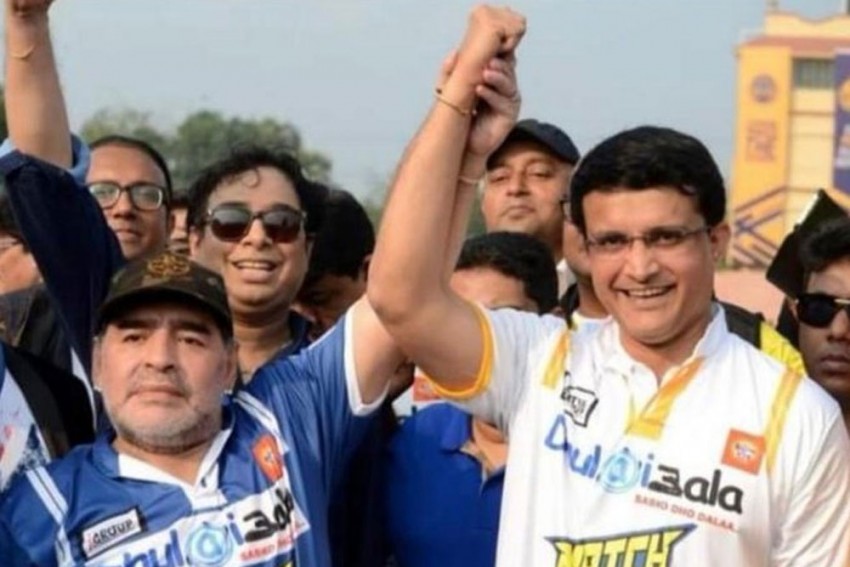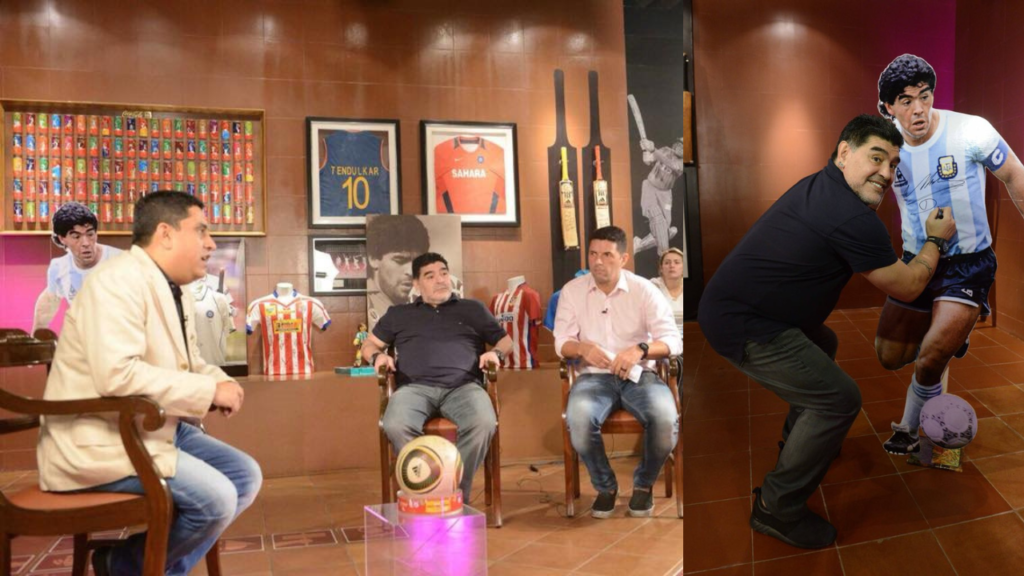With Emiliano Martinez now in Kolkata, there are continuous references to two of the greatest footballers the world has seen – Lionel Messi and Diego Maradona. I have had the privilege of meeting both. In the case of Maradona, it was up close and personal, while with Messi, it was a rather strange encounter.
With Martinez still in the city, it is time to look back and remember my meeting with Maradona.
December 2017.
He had just about settled down in his chair for the interview when I decided to spice things up a little. “Cristiano Ronaldo claims he is the greatest,” I said. “How do you react to that?” As his interpreter translated the question for Maradona, I thought I sensed a degree of unease. I was wrong. All of a sudden, he burst into a fit of laughter. And it continued for nearly 15 to 20 seconds. “Cristiano is a very good player,” Maradona began. “But greatest?” He looked at me, and just gestured with the certainty that made him what he was. A temperamental genius, and the most charismatic footballer ever.
I tried one more time. “If Messi does lead Argentina to a World Cup win, do you think he can claim to have equalled you?” I asked. When Messi did, last December, Maradona, sadly, wasn’t around to see it.
When I asked him the question, however, the answer was immediate. “Leo can never be Maradona.”
In the second half of his life, he put on a lot of weight. But the skill that enthralled millions never deserted him. With 10,000 people cheering for Diego, it was fitting that we asked him to sign a few balls and kick them into the crowd. Maradona was keen to oblige. But just as I handed him the marker to sign the ball, something changed. Even as he signed the ball, his gaze was somewhere else. And even before I realised it, he had back-heeled the ball into the crowd.
In a minute, three balls had been sent to three different corners, sending thousands into ruptures. And all of it happened in a flash, leaving us stunned and bewildered. If the entire English team was unable to stop this man in 1986, who was I to feel stunned, I consoled myself. And Maradona enjoyed every bit of the action. He knew he had scored. He laughed and gave me a pat, as if to say: try another time.
The best, however, was reserved for the moment he was asked to sign a life-size cut-out of his. Before I could hand him the marker, he had run to the cut-out and started speaking to it. This monologue continued for a good three to four minutes, and ended when he carried the cut-out with him to the interview set and placed it in a strategic position where it was visible to him. “He is saying, are you the same person, my dear,” said his interpreter. “He is saying this man (referring to the image) has scored some fantastic goals and is the best football player in the world. And sensing that this is the cut-out from the 1986 match against England, he says this is the best he has ever played and this goal is the best ever in the history of world football.”
Vanity? Maybe. Justified? Many millions would say so.
Sourav Ganguly, one of India’s biggest sporting icons, was more of a fanboy when he met Maradona. “I am biased, you know,” said Ganguly. “I grew up watching him, and my love for football was largely because of Maradona. His performances in the 1986 World Cup in Mexico will forever remain with me.”

So, what was it about Maradona that made him such a legend, I asked Ganguly. “Pele had the team of the century in the 1950s,” he said. “Vava, Didi and Garrincha were all legends in their own right. But look at Maradona. Take him out, and none of the others in the team were real legends of the game. He carried the team on his shoulders and to win a FIFA World Cup on his own makes him what he is.”
When I repeated this to Maradona, he was all smiles. “He is very kind,” he said, pointing at Ganguly, before scoring one more of his trademark ones. “I had to win the World Cup,” said Maradona. “They had all gone after me in 1982, and I was much too young. 1986 had to be my year. Beating England and Belgium and Germany, it could not have been better. It meant the world to us in Argentina, and showed that facilities don’t produce champions.”
And as we parted, Maradona dribbled past us one final time. “He is saying you have met Pele, and now you have met Diego,” said the translator. “So who do you think is better, Diego or Pele?” Maradona, I could see, had a wicked smile on his face, and was enjoying each second of what was going on. He was both jury and judge. I had no option of saying Pele, and he loved the awkwardness. “Tell your football federation I want to be involved in developing your football,” he said. “There is so much passion here. I followed the U-17 World Cup. India can do really well in football if you put a proper structure in place.”
Could we have hired him? Surely not. Except for the football pitch, the world couldn’t really afford his genius.
As he settles down in heaven, the one request I have for the gatekeepers of the afterlife, on behalf of every football fan from across the world, is that Maradona should always be left with a football. That’s the only way he will be at peace with himself, for that was what he enjoyed most in his 60 years on our planet.




